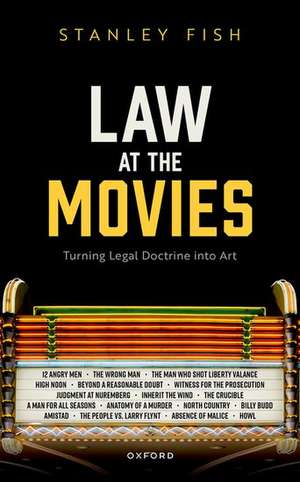Law at the Movies: Turning Legal Doctrine into Art: Law and Literature
Autor Stanley Fishen Limba Engleză Hardback – 29 feb 2024
Preț: 166.88 lei
Preț vechi: 192.48 lei
-13% Nou
Puncte Express: 250
Preț estimativ în valută:
31.93€ • 33.45$ • 26.47£
31.93€ • 33.45$ • 26.47£
Carte disponibilă
Livrare economică 08-14 martie
Livrare express 04-08 martie pentru 50.42 lei
Preluare comenzi: 021 569.72.76
Specificații
ISBN-13: 9780198898726
ISBN-10: 019889872X
Pagini: 224
Ilustrații: None
Dimensiuni: 140 x 225 x 15 mm
Greutate: 0.39 kg
Editura: OUP OXFORD
Colecția OUP Oxford
Seria Law and Literature
Locul publicării:Oxford, United Kingdom
ISBN-10: 019889872X
Pagini: 224
Ilustrații: None
Dimensiuni: 140 x 225 x 15 mm
Greutate: 0.39 kg
Editura: OUP OXFORD
Colecția OUP Oxford
Seria Law and Literature
Locul publicării:Oxford, United Kingdom
Recenzii
The book is a stimulating read.
Fish asks how legal doctrine-the specific rules and procedures invoked andanalyzed by courts on the way to declaring a substantive decision-can be turnedinto filmic art. In the movies he discusses, points of doctrine and procedure do not serve as background to the substantive issues that drive the plot and provide the characters with choices. Rather they declare the plot, and character is formed and tested in relationship to their demands; what seem as technical matters are pressed until they occupy both foreground and background and become the movie's true subject.
Fish asks how legal doctrine-the specific rules and procedures invoked andanalyzed by courts on the way to declaring a substantive decision-can be turnedinto filmic art. In the movies he discusses, points of doctrine and procedure do not serve as background to the substantive issues that drive the plot and provide the characters with choices. Rather they declare the plot, and character is formed and tested in relationship to their demands; what seem as technical matters are pressed until they occupy both foreground and background and become the movie's true subject.
Notă biografică
Stanley Fish is Davidson-Kahn Distinguished University Professor and Professor of Law at Florida International University in Miami, and Dean Emeritus at the College of Liberal Arts and Sciences and Distinguished Professor of English, Criminal Justice and Political Science at the University of Illinois at Chicago. In addition to being one of the leading public intellectuals in the US, Fish is an extraordinarily prolific author whose works include over 200 scholarly publications and books, including The First: How to Think About Hate Speech, Campus Speech, Religious Speech, Fake News, Post-Truth, and Donald Trump (2019), Winning Arguments: What Works and Doesn't Work in Politics, the Bedroom, the Courtroom, and the Classroom (2016), and Versions of Academic Freedom: From Professionalism to Revolution (2014).










